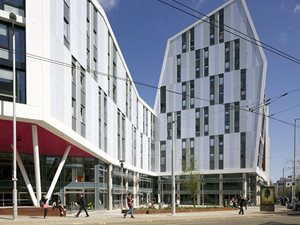First year students and institutional accommodation
First year alternatives to institiutional accommodation
Returning students and instititional accommodation
Availability of instititional accommodation within the letting year
The pros and cons of living in institutional accommodation
 First year students and institutional accommodation
First year students and institutional accommodation
 Many universities and colleges offer accommodation provided directly by them (or a nominated partner) to first year students. Indeed, an institution may well offer some kind of guarantee to house first year students, so long as they complete a booking form and return it by a given deadline.
Many universities and colleges offer accommodation provided directly by them (or a nominated partner) to first year students. Indeed, an institution may well offer some kind of guarantee to house first year students, so long as they complete a booking form and return it by a given deadline.
Information about university or college provided housing should be set out in the institution's main prospectus, on their website or in a separate booklet available on request. If you are applying to an institution for accommodation, it's essential that you follow the procedures properly. You are not going to get accommodation from your institution if you contact them a few days before you are due to start your course.
 First year alternatives to institutional accommodation
First year alternatives to institutional accommodation
Many colleges and universities - normally the newer universities, the smaller specialist colleges or institutions in high demand housing areas such as London and the South East - do not house all their first year students. For these institutions significant numbers of students live in the private rented sector from the very start of their course.
The institution will almost certainly have a number of special services to help first year students find housing and introduce them to other, similar students. You will be able to access these services directly from your institution.
Some new students - often older or more independent students, including but not limited to postgraduates - simply do not wish to live in halls provided by the college or university. The institution may offer advice and/or services to support students with these preferences in their search for suitable accommodation. Additionally, they can follow the advice made available here for returning students, most of whom live in the private sector. sector.
 Returning students and institutional accommodation
Returning students and institutional accommodation
 Many institutions house a proportion of their returning students in their own accommodation. If you are a returning student who wants to stay in or move back into institutional accommodation next time round, you will need to follow the procedures and fill in the forms that the institution has put together for these purposes. You will be able to get the requisite guidance and forms from your Accommodation Office. A fair number of returning students choose to move from a shared house in the private sector back into university provided accommodation for their final year.
Many institutions house a proportion of their returning students in their own accommodation. If you are a returning student who wants to stay in or move back into institutional accommodation next time round, you will need to follow the procedures and fill in the forms that the institution has put together for these purposes. You will be able to get the requisite guidance and forms from your Accommodation Office. A fair number of returning students choose to move from a shared house in the private sector back into university provided accommodation for their final year.
Some institutions reserve their own accommodation exclusively for first year students, perhaps with some exceptions (e.g. international students and some disabled students with specialist living needs). As a rule therefore, they do not house returners; something that they will normally notify to students during their first year. In these circumstances, students already at an institution will need to secure somewhere to live in the private sector for any subsequent years of study.
 Availability of institutional accommodation within the letting year
Availability of institutional accommodation within the letting year
Once the academic year is under way, a few first year students will inevitably leave and some short stay students move to industrial placements or abroad. This will free up a few rooms after the first few days of term. If demand for these rooms is high, the institution may have a waiting list or some kind of allocations procedure, but normally these places are let on a first come, first served basis. To apply, simply contact your Accommodation Office.
University accommodation is a particularly good option if you need somewhere to live for just a few weeks. This is because institutions tend to be much more flexible about giving short lets. Again, contact your accommodation office for details.
 The pros and cons of living in institutional accommodation
The pros and cons of living in institutional accommodation
 In the first year, it is much easier to rent a room from the college or university than it is to go through the hassle of house hunting in an area that you don't know well, if at all. There are also often social advantages in moving into a building full of similar, newly arrived students.
In the first year, it is much easier to rent a room from the college or university than it is to go through the hassle of house hunting in an area that you don't know well, if at all. There are also often social advantages in moving into a building full of similar, newly arrived students.
On the flip side, a large number of co-resident students who do not know each other on arrival can produce disharmony amongst those who find that they do not "get on". Noise generated in high density buildings can also be a problem: when so many people are living together, there will, at any given time, be a reason for one group or another to be making a noise.
If you plan to live in university accommodation, it's important you choose carefully. Often, unhappiness or dissatisfaction stems from students simply not having thought through what they really wanted. If you want to cook, don't go for a catered hall. If you want to live in institutional accommodation close to the campus, make sure it's not three miles up the road. If you want to live with a large group, go for accommodation where the set-up reflects this. Similarly, if you want a mixed flat, make sure that where you apply to offers this arrangement.
Universities often have large portfolios that offer a considerable breadth of choice: exercise that choice positively.

